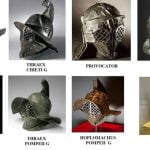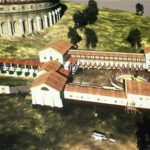In 2015, archaeologists discovered an ancient gladiator school near the former Carnutum (present-day Vienna, Austria). The place is full of stones, with visible remnants of the training arena and thermal baths.
The gladiator training complex was discovered not through excavations, but through the use of remote sensing techniques. Through this research, the researchers were able to obtain a three-dimensional image of the school.
The school was probably built in the 2nd century CE and covered an area of 2,800 m2, where the courtyard was the central point. In the middle of the square, there was a free-standing structure with a diameter of 19 meters, which could be a fighting arena. According to researchers, the arena could be surrounded by wooden stands. In the middle of the arena, there was certainly a wooden stake (palus), which was used to polish the fighting technique and deliver blows.
There were probably gladiators’ cells in the southern wing of the complex, while in the western part there were quarters of a better standard, intended for trainers (lanista) or former gladiators. The complex also included bathhouses where the warriors could rest after the fight and relax.






